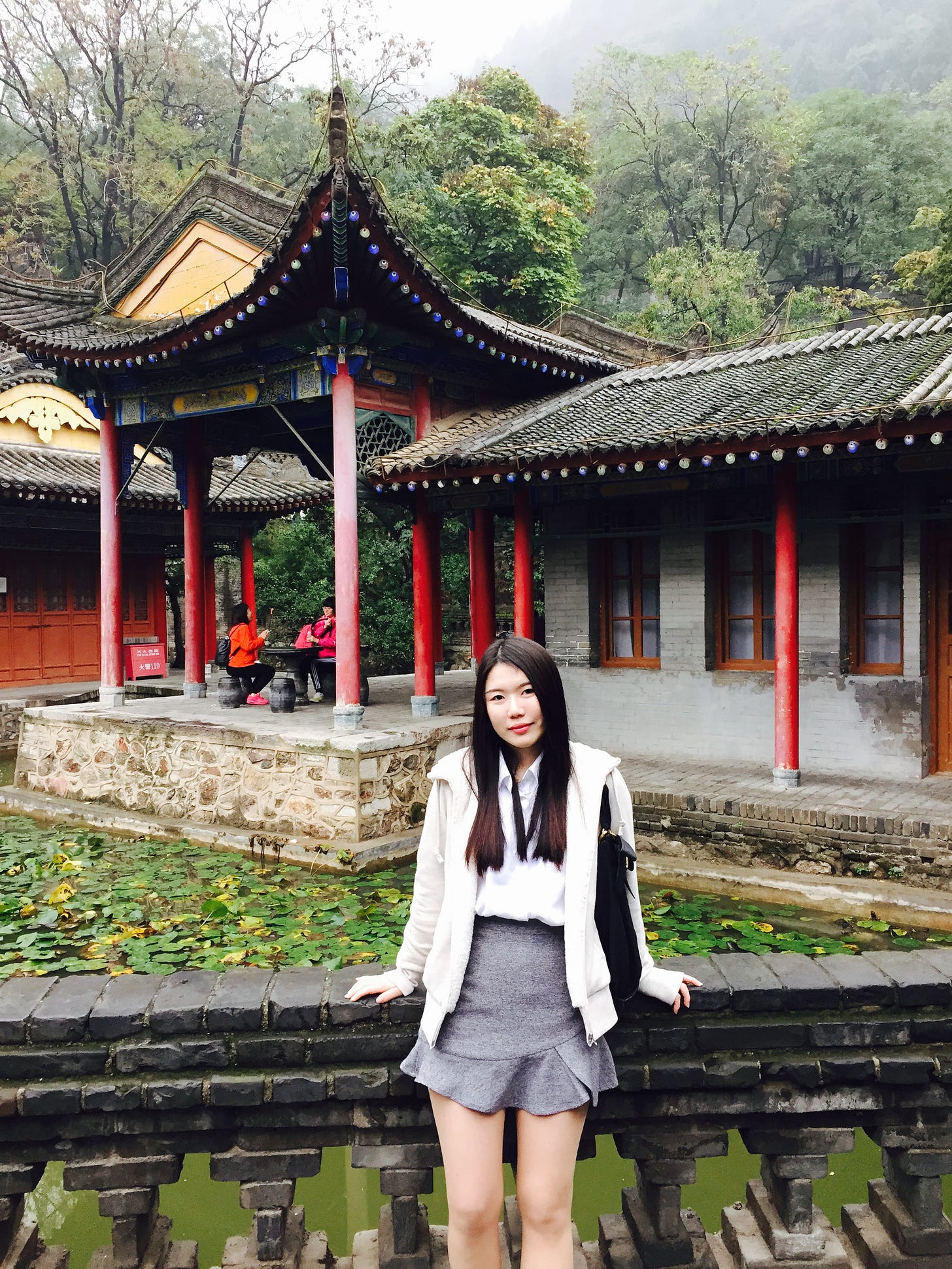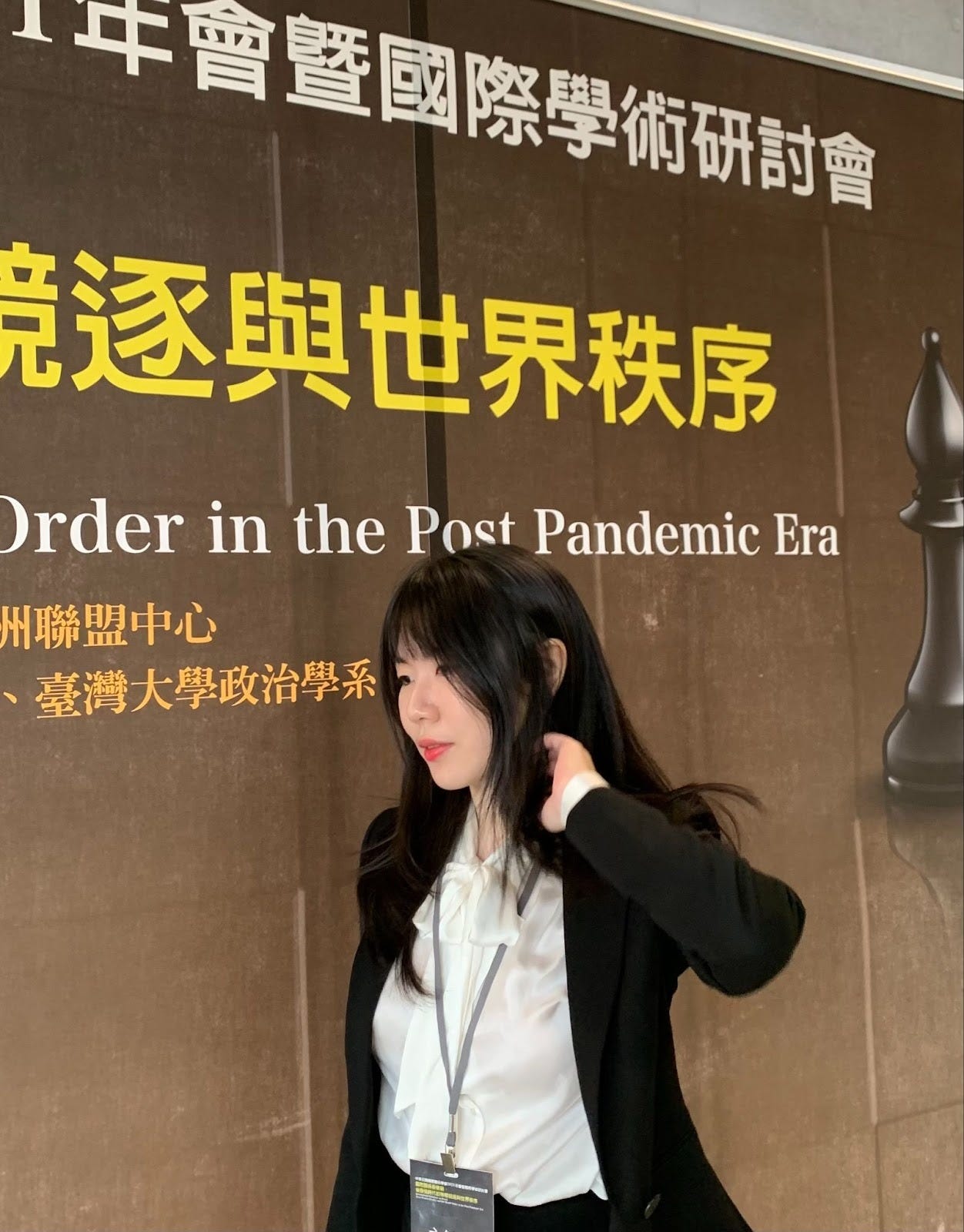Originally from South Korea, Jieun began learning Chinese at 20, sparked by her love for K-pop and curiosity about Chinese entertainment. What started as a casual interest soon turned into a transformative journey that led her to study in Shenyang, Beijing, and Taipei. Over time, she achieved HSK Level 6, earned a master’s degree from National Taiwan University, and is now pursuing her Ph.D. at the University of South Carolina while sharing her life abroad on YouTube.
In this interview, Jieun talks about the motivation that fueled her rapid progress in Chinese, the challenges of mastering listening and literacy, and how living across China, Taiwan, and the U.S. has shaped her outlook on language, culture, and personal growth.
Can you introduce yourself and tell us a little about your background?
Hey y’all! My name is Jieun, from South Korea. I’m currently a Ph.D. student at the University of South Carolina, and I also run my YouTube channel where I share videos about my life in America.
I started learning Chinese in the summer when I was 20. It’s kind of funny — at that time, I was really into Lu Han, a Chinese member of the K-pop idol EXO. He often appeared on Chinese variety shows, but since there were no Korean subtitles, I could only watch without understanding anything. So I thought, “Maybe I should just learn Chinese myself!” That’s how it all began.
Can you walk us through your Chinese learning journey from the beginning to where you are now?
Although I started learning Chinese through song lyrics and TV programs, I thought I needed a more systematic approach to improve it. So I registered for an elementary Chinese class at my university from that fall semester. Since it was my first time taking a Chinese course, I started from maˉ, maˊ, maˇ, maˋ. After the semester, I realized I was really into learning Chinese and thought studying in China would be the best and fastest way to improve it.
But when I asked my parents to let me study abroad, they gave me one condition: “If you pass HSK level 4, then we’ll allow you to study in China.” So during the next semester, I studied really hard to meet that condition, passed the exam before the semester ended, and started studying at a language center in Shenyang (沈阳) that summer.
After 6 months in Shenyang, I passed HSK Level 5. Then I kept studying in Beijing and passed HSK Level 6 after one more semester. Once I got HSK 6, I had the chance to study at Tsinghua University as a visiting student.
Those 2 years in China really helped me get to the point where I could study my field completely in Chinese. Later on, I got a scholarship from Taiwan’s Ministry of Education for my master’s program at National Taiwan University and spent about 4 years in Taiwan.
If we take HSK 6 as the benchmark for the advanced level, it took me about 2 years in total from when I first started learning Chinese to when I reached that level.
What were the biggest challenges you faced as you progressed, especially when transitioning from intermediate to advanced?
The biggest challenge I faced was listening. When I was preparing for the HSK Level 4 test, I had no problem with listening exercises. But in real-life conversations, I could hardly understand anything. When I first went to China, I soon realized I couldn’t even order at McDonald’s because I couldn’t understand what they were saying.
To overcome my listening difficulties, I tried to expose myself to as much Chinese as possible. I watched many Chinese TV shows without Korean subtitles and made a lot of Chinese friends. Luckily, the K-drama My Love from the Star was a huge hit all across China back then, so it was easy to meet Chinese students who wanted to hang out with me.
After surrounding myself with the Chinese language like that, my listening and speaking skills improved very quickly. But then a new problem came up. Since Chinese is a logographic language, I often found that I could understand a word perfectly in conversation but not recognize it when it was written (basically I was kind of illiterate haha). Honestly, this is still something I haven’t completely overcome, but to get better, I spent more time studying at my desk, writing characters over and over and looking up any I didn’t know in a dictionary to memorize them.
What specific methods, tools, or resources helped you the most in achieving fluency?
At the beginning I listened to tons of Chinese songs and watched TV shows, even though I couldn’t really understand them. I think that helped me learn Chinese the way babies learn languages – just by being exposed to it naturally. So once I added systematic classes on top of that, it created a really good synergy.
Even now, I try to keep up my Chinese by listening to Chinese songs, watching Chinese films, and chatting with my Taiwanese friends.
But no matter what method you use, I think the best one is the one you can enjoy. The reason I was able to improve my Chinese so quickly was because I really enjoyed the process and never saw it as “studying.”
How do you create opportunities to practice Mandarin in your daily life?
After finishing my Chinese studies at a language center in Beijing, I spent one semester back in Korea before going to Tsinghua University. During that time, I joined my university’s international exchange club. Since I could speak Chinese, the club paired me with students from Hong Kong and Taiwan. I ended up using Chinese naturally while showing them around campus and taking them on tours around Seoul.
How has learning Chinese changed your perspective on Chinese-speaking cultures or influenced your personal growth?
Learning Chinese completely changed my life. Before I started learning it, I never imagined myself living abroad. I actually used to hate studying foreign languages because I really struggled with English back in school. But after learning Chinese, I became much more open to different cultures and was able to make friends from all over the world. It also naturally improved my English skills, since I often used English to communicate with international friends while I was in China and Taiwan.
As a researcher, being able to speak three languages has opened up so many opportunities. Knowing both English and Chinese – the two most widely spoken languages in the world – has given me access to a much larger amount of information, which has been incredibly helpful for my research.
Also, I really love the life I’ve built by living in different countries, and learning Chinese opened that path for me. I’ve lived in China, Taiwan, and Canada, and now I’m in the United States. Honestly, I can’t wait to see where I’ll be and what I’ll be doing five years from now!
What are your favorite aspects of the Chinese language or culture?
I love how Chinese varies by region — people’s accents and even the words they use can be completely different. When I lived in Shenyang and Beijing, people added “er” (儿) to almost every word or sentence. But when I moved to Taiwan, I noticed that people hardly use “er,” and their Chinese sounds softer, almost like Japanese. Also, the same words are often pronounced differently in China and Taiwan. For example, the word 垃圾 is pronounced lājī in China, but lèsè in Taiwan. I found those differences really interesting!
What advice would you give to learners who are at the intermediate level and want to reach advanced fluency?
My advice would be to expose yourself to the Chinese language environment as much as possible. Especially when you’re trying to move from the intermediate to the advanced level, it’s really important to observe and learn how native speakers actually speak. The best way, of course, is to make Chinese friends. But if that’s not possible, you can find Chinese media you enjoy (whether it’s TV shows or movies) and try shadowing them.
These days, you can even use GPT as a learning tool! You can chat with it only in Chinese and ask for feedback based on your conversation. That’s something I actually do quite often these days, and it’s really helpful.
What were the things that surprised you the most in your journey?
Before going to China, I thought Korean and Chinese cultures would be pretty similar since the two countries are so close. But after actually living in China, I realized there are a lot of differences. What I liked the most was that people didn’t really care about what others were doing.
In Korea, I used to put on makeup even just to go grocery shopping. But both in China and Taiwan, people would walk around or go to class with no makeup at all. At first, I was really surprised, but I quickly got used to it. And now I hardly wear makeup unless it’s a special day.
It wasn’t just about makeup, though. I felt that people generally don’t care much about how others dress or behave, and that gave me a real sense of freedom while I was living there.
Are there some common misconceptions about the language that you believe are not true?
Some people say that Chinese sounds noisy and that people speak very loudly, but I don’t think that’s true. It really depends on the speaker. For example, if you watch interviews with Tang Wei, a famous Chinese actress, you’ll be surprised by how softly and elegantly she speaks Chinese. Listening to her made me realize that Chinese can sound very gentle and beautiful, and I’ve been trying to speak it that way too haha.
Do you have your favorite Chinese idiom or saying you would like to share with us?
I really like the saying “万事如意” (wàn shì rú yì), which means “May everything go as you wish.” It’s something people often say during the Lunar New Year. I love how it feels full of warmth and hope—it makes me think of people gathering together in the cold season, sharing food and good wishes. It’s a phrase that always gives me a sense of new beginnings.
Connect with Jieun!
Youtube: www.youtube.com/@SCPhDlife
Website: https://bje1012.github.io/







